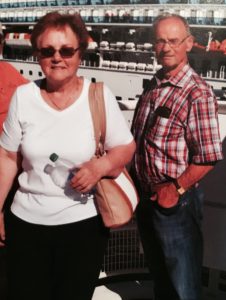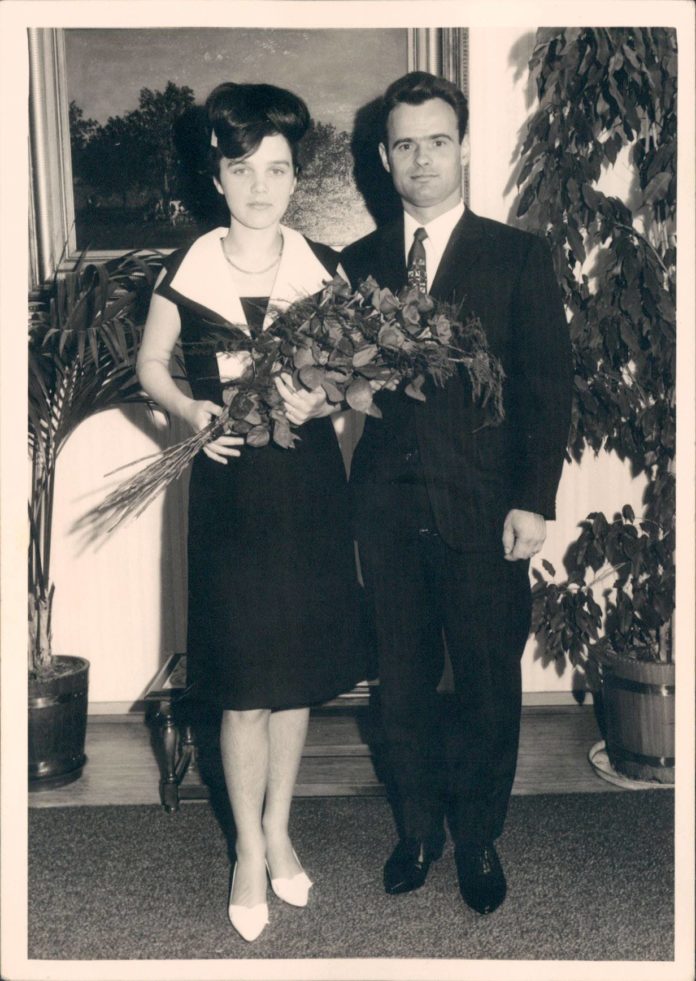In the ‘70s and ‘80s, brick fire places were in popular demand and cement block buildings were being erected throughout the City of Revelstoke. From the Revelstoke Forum, the city sheds and the power plant by Cranberry Creek, Martin Miertsch had a major hand in the final product, in fact, chances are if you have a brick fire place in your home that is original, Martin created it.
Martin Miertsch arrived in Canada from Cologne, Germany in 1957 with three friends in search for the Canadian dream and a better life. Before departure, the choices were between Canada, Australia and the United States. The three friends chose Vancouver, British Columbia as the climate in Western Canada was similar to what they were used too. To Canada they shall go. After arriving in Vancouver, with little money and a huge language barrier, the three searched for work in the city. Martin was determined to learn the English language and he studied endlessly. During the time of study, he learned of a job in a sawmill in Arrowhead, a small town somewhere in the mountains. Martin worked at the sawmill until it caught fire and burned to the ground in July of 1958, forcing Martin back to the coast in hopes for another job.
Martin in fact found work as a carpenters’ assistant until it went belly up. By then Martin had learned of a small town called Revelstoke that was in desperate need of a bricklayer/mason. In 1966, Martin decided to go back to Germany to visit a friend, and unbeknownst to him, he would become smitten with his friends younger sister, Heidi.
This is where the real love story begins.
After returning back to Revelstoke, Martin and Heidi would communicate through letters, however, being that Heidi lived in East Germany under the Communist rule, they wrote their letters of affection in code that only they knew how to break it.
“The Communist Government did not want contact. We also had to be careful of relatives finding out that we had become close. You could not trust anyone in East Germany during this time, not even your brother.” Martin told the Revelstoke Current.
In 1966, during a visit home, martin and Heidi had a serious discussion of whether or not Martin would return to Germany permanently or to sneak Heidi out of East Germany and flee to Canada.
“I was 20 years old, I had enough brains to know that if I ask him to come back and things didn’t work out between the two of us, he would have left everything that he’s got and I would feel awful.” Heidi proclaimed.
At this time, Martin was not too keen on leaving Canada behind as he owned two homes in Revelstoke and that was quite the establishment for a young man. That was when Martin began to craft his plan on how to get Heidi out of Germany illegally.
The border crossing at East Berlin and West Berlin called Check Point-C or “Check Point Charlie” had a tendency to be somewhat lenient to foreigners crossing, and because Martin was now technically a Canadian citizen, he was a foreigner. He decided to cross as a Canadian to see just how tight the security really was.
“I was in Dessau, and you are not allowed to just travel anywhere in East Germany. You had to have a permit. What was I going to say when I wanted to go to West Berlin? I couldn’t say I wanted to go and buy Bananas! I needed a good reason to go to Berlin.”
 Martin had to lie to the police in Dessau and claim that he wanted to go to Czechoslovakia, Austria and back into West Germany, to see the countries. For that, a visa was needed from the Czechoslovakian Embassy. After going to the Embassy, he received the visa and went back to Check-Point-Charlie, crossed over, burned some time and then came back over the border. The Secret Service immediately arrested him upon his return to the checkpoint. After being questioned for sometime, they released Martin, but then he knew that there was no way to sneak Heidi out that route.
Martin had to lie to the police in Dessau and claim that he wanted to go to Czechoslovakia, Austria and back into West Germany, to see the countries. For that, a visa was needed from the Czechoslovakian Embassy. After going to the Embassy, he received the visa and went back to Check-Point-Charlie, crossed over, burned some time and then came back over the border. The Secret Service immediately arrested him upon his return to the checkpoint. After being questioned for sometime, they released Martin, but then he knew that there was no way to sneak Heidi out that route.
This is when Martin risked everything, and decided to falsify his Canadian passport by changing the name MARTIN to MARTINA and under sex he placed an FE front of “MALE”. Heidi had a photo made, and Martin glued it onto of his, and then took a nail and made tiny impressions on the photo that would resemble the Canadian Certification stamp.
“At that time you could tell an East German from a West German, simply by their clothing. She had some cloths that someone sent to her.”
“I had shoes and some cloths that were in style. That is what I wore.” Heidi chimed in.
During this time, an individual could not cross from East Germany to West Germany with a simple passport. The proper documents stating that the traveller was allowed to cross were needed and those documents are issued a day before departure. Martin forged those to look as legitimate as possible.
“I knew what they do when they cross by train from East to West, they are extremely strict. So I had her travel at night, because by the time she would arrive at the border, it would be dark and the fluorescent lights in those trains would take forever to turn on. When they did, they would go off and on, off and on. I told her make sure you sit by the door and have your passport out, because they go over quickly, look at you and check those papers.” said Martin.
Their was an industrial fair going on at the time which was the best time to try and escape as the East Germans, at the time, would be somewhat lenient as they wanted to be perceived as warm, to the outside world. This was exactly what Martin was hoping for when the escape was in motion. The Border Patrol requested Heidi’s passport and her papers, they searched the entire train, from top to bottom leaving Heidi very nervous.
“One guy said, ‘Wouldn’t it be funny if we had an escapee in here tonight?’ I never forgot that.”
Upon arrival in West Germany, the Border Patrol analyzed the passport belonging too “Martina Miertsch”, while Heidi nervously waited for them to spot the false passport. Luckily, they wrote the date and time down and she was free to enter.
“They looked at it and didn’t see anything wrong with the passport. so I must have done a good job.” chuckled Martin.
Before Heidi took the train from the East Germany, she took vacation time from work. So when the secret police were looking for anything suspicious or any missing East Germans, Heidi was not on the radar because everyone including her Communist Step-Father thought she was on vacation doing her own thing locally.
Martin at this time was still in East Germany and needed to find a way out, now, without a Canadian Passport. After reporting the loss of his documentation, the police grilled him on whether it was stolen or lost. Martin claimed he backtracked his steps but to no avail, however, he was in no rush to get them back as he was going to visit more friends and family, is what he told them. what Martin did not know is the police were investigating him by questioning his family and neighbours. Luckily, he received papers to leave East Germany.
“Holy Shit, I thought to myself. How lucky can one man get?” Martin exclaimed. “The next train that left East Germany, I was on it!”
When arriving at the border, they questioned him about the departure documents he received from the East. They pulled him from the train and questioned him even further about who he was and where he was from. They kept him overnight to confirm those papers were, in-fact, real.
“When you sit there for four or five hours….you are scared…at about 10:00am in the morning there was a train. They told me I could be on it. Holy shit… I thought (again) how lucky can I get (again)!”
Once Martin was reunited with Heidi, they were elated to be with each other. Now it was time to get Heidi to Canada. However, Heidi was technically a Communist resident, which would not allow her to leave for Canada for a minimum of two years. It wasn’t until a young gentleman from the embassy quietly informed them that if they were to be married, that the two year waiting period would fade away. Martin and Heidi met with a Justice of the Peace and were wed in Cologne, Germany, 1966.
“I thought I would use my ID card to get onto the big ship to get to Canada. You are not able to travel on it, you needed your passport. I showed it to the fellow, he said ‘Secret Police’? I just nodded, and they let me in.” Martin said in disbelief.
Heidi stepped off the train in Revelstoke on her 21st birthday, 1966. That November their first daughter, Martina was born.
Heidi noted that one story sticks with her and that is of her sister. After her sister dropped her off at the train station in East Germany as visiting tourist, Martina Miertsch, her sister hailed a cab. The driver did not want the fare as he wanted to get home to watch his favourite American TV show. She pleaded with him for the ride and even invited the cab driver to watch the show at her house back in East Germany. The cab driver agreed to the terms, drove her home and did in fact, watch the tv show at her residence, where the Communist Step-Father lived.
The show was The Fugitive.




